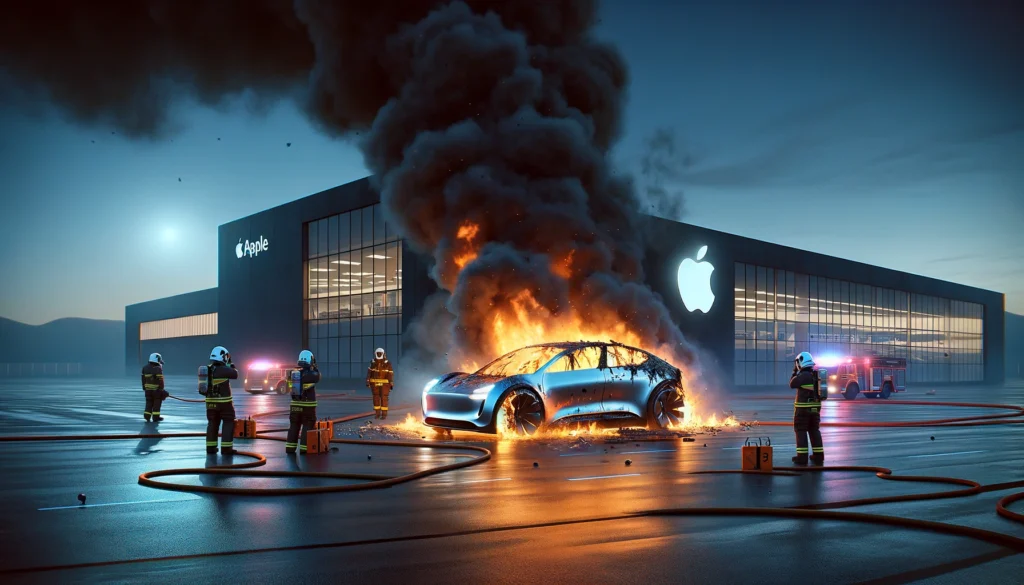In a dramatic and costly shift in strategy, Silicon Valley stalwart Apple, has officially capitulated on its ambitious foray into the fiercely competitive and complex electric vehicle market. According to reputable sources, the tech behemoth has abandoned its decade-spanning endeavor, known as Project Titan, in which billions of dollars have reportedly sunk in an attempt to compete with industry front runners such as Elon Musk’s Tesla Motors.
The termination of Project Titan isn’t simply the result of a corporate change of heart. A recent report by The Wall Street Journal reveals an alarming scenario of hemorrhaging funds and a beleaguered pursuit to close the significant lead commanded by competitors. Candidly, technology analyst Richard Windsor last year reinforced the seeming incongruity, stating unequivocally that “it makes no sense whatsoever for Apple to sell a car,” further highlighting that Apple’s enormously profitable business model, accrued from a 40-50% gross margin on its products, would be untenable within the notoriously low-margin automobile industry.
Apple’s now-defunct automotive aspirations weren’t confined only to producing a rival to Tesla’s sleek, consumer-beloved electric vehicles. The company also envisioned unprecedented advancements in battery and autonomous vehicle technology. They sought a revolution, aiming to reduce the prohibitive costs of electric vehicle production through proprietary battery technologies and realize a software solution to make their automotive ambitions fully self-driving. Now, their approximately 2,000 Project Titan employees face an uncertain future, with some assigned to different areas within the company, while others are to be laid off.
News of Apple’s retreat was met with significant relief among stakeholders, including Dan Morgan, a senior portfolio manager at Synovus Trust, an Apple shareholder. Referencing the technological and market challenges inherent in electric vehicle production, Morgan observed, “When you looked at Apple’s future initiatives, the car project was always the most far-fetched for Apple. This just isn’t in their wheelhouse.”
This unexpected development comes amidst a backdrop of a rapidly waning enthusiasm for electric vehicles, further evidenced by Apple’s own revamped release schedule from 2026 to 2028. Further discouragement comes from revered German automaker Mercedes-Benz, which recently discarded its plans to exclusively produce electric vehicles post-2030, citing persistent low demand. This wide-ranging consumer apprehension is reflective of a multitude of factors, underscoring a lack of charging stations, long recharging durations, and adverse weather performance as significant obstacles to widespread adaptation.
Similarly, The New York Times has reported that the Biden administration is prepared to relax its previously bullish stance on transitioning U.S. consumers towards electric vehicles. Anticipated to be welcomed by automakers and labor unions quick to highlight practical and economic issues surrounding compatibility, production, and consumer demand, this governmental volte-face underscores the formidable barriers to a swift and seamless transition to electric vehicles.
In conclusion, Apple’s withdrawal from the electric vehicle arena underscores the monumental task of not just equaling incumbent prime players like Tesla, but of surmounting market reservations and practical impediments to electric vehicle adoption. As automakers and governments alike recalibrate their electric vehicle strategies in response to realistic consumer demand and on-the-ground challenges, it becomes clear that transitioning to an all-electric vehicular future is neither as smooth nor immediate as projected. If Apple – a company renowned for its disruptive innovations – can be deterred, the road ahead is surely not an easy one. Yet such challenges often spur innovation. Thus, the realms of battery technology, autonomous driving, and low-cost production will now seek their champions elsewhere.



